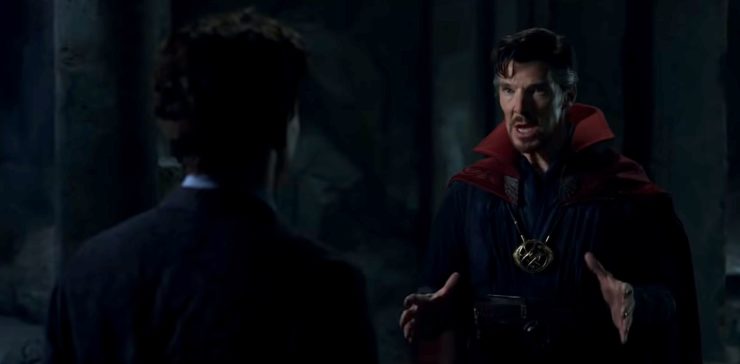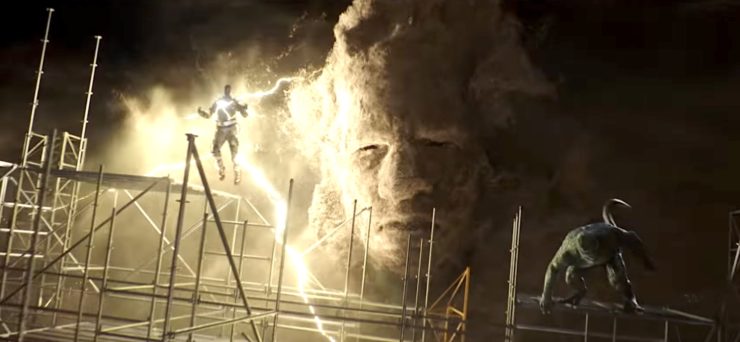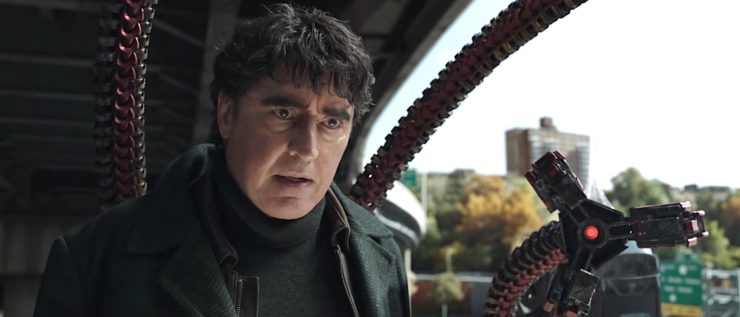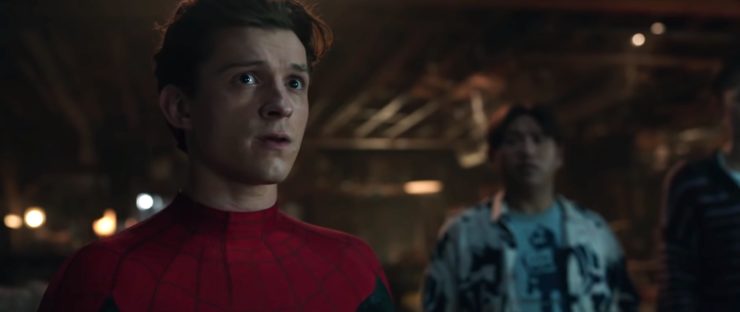After the unequivocal triumph of 2018’s Into the Spider-Verse, it’s hard to imagine what more any multiverse has to offer a Spider-Man story. It’s perhaps even harder to imagine what a multiverse could offer the MCU when their machinations of late have seemed very paint-by-numbers—particularly in regard to characters they already know how to package and sell.
With that in mind, No Way Home feels like the cinematic equivalent of being handed a small, extremely personal gift after being clobbered over and over with plastic commercial noise. It’s comforting in ways you cannot expect until you’re grabbing it with both hands and crushing it into your being.
[Spoilers for No Way Home below.]
Now, this might not hold true for every person watching the film; No Way Home is a very specific ode to the live-action Spider-Man films that cornerstoned the superhero genre of the 21st century, and the webslinger’s affable, yet inescapable, mega-box office presence as one of our most beloved costumed heroes. If you’ve got no fondness for those films, for the characters within them and experience of watching them over the past two decades, you’re not likely to be moved by what this movie offers.
But the current slurry of nostalgia that pop culture media continues to gorge itself on makes any critic or casual viewer wonder—is it possible for stories that are framed primarily on our love for other stories to be meaningful outside of an /insert gif “I understood that reference” serotonin hit? Because the answer usually feels like no. It can be disturbing to watch fans mistake recognition for emotion, familiarity for thematic resonance. And sure, there’s a piece of my own brain that kept pinging, prodding at me, asking “Is this movie really making you feel something, or are you just enjoying the Spider-smoothie?”
That means that No Way Home always had a lot to make good on, particularly after the relative disappointment of the MCU’s first Spider-sequel, Far From Home (which was fine, but also completely weighed down by the aftermath of Endgame, and desperately trying to stay a cute teen movie with mixed results). The knowledge that the multiverse was part of the plot, the casting announcements that confirmed only about half of the character roster, it was enough to make anyone nervous. How could any one movie hope to pack so much Spider-Man into its tiny frame?
The answer turns out to be relatively simple, in fact—it had to focus on what makes Spider-Man special, which has always been his need to help others.

And that comes to the forefront easily when your plot intentionally juxtaposes this Peter Parker (Tom Holland) with Stephen Strange (Benedict Cumberbatch), his only superdad left following the loss of Tony Stark. Within the confines of the MCU, Doctor Strange is self-aggrandizing, currently depressed (no matter how he tries to hide it), and has been trained from initiation to go macro-level on how he perceives and handles every manner of threat. When Peter botches Strange’s little spell meant to make everyone forget Peter Parker is Spider-Man by continually layering in exceptions to that rule, the resulting magic drags in any number of multiverse pals who also know Peter’s secret. Chaos ensues and Strange has a simple solution—bag them and send them all back to their universes.
Where they will all die, because they’re all supervillains who don’t know when to quit.
There’s a lot to be said about how this story also allows for a far more creative brief when it comes to actions sequences and centerpiece set-ups. While no Marvel film can seem to escape the muddy CGI-a-thon that batters every final half-hour of their more recent fare, No Way Home gives us too much interpersonal give-and-take to allow those sequences to take precedence. Too many characters have to talk, to look each other in the eye, to quip and wound and recollect, for anything to get bogged down for very long. Every time you get worried that you’ll lose track of a fight, there’s a pause. You regain your footing, and the whole thing begins again.

They’re all supervillains who don’t know when to quit, but plenty of them are the old guard sort who know the value of a good monologue and a hefty heaping of backstory to make it worth our while. We deserve time to appreciate them all over again, and the film is thankfully keen to oblige.
It’s amidst all this that No Way Home does something unexpectedly subtle and devastating; everyone who knows the baseline Spider-Man mythos knows that Peter Parker becomes Spider-Man due to the death of his Uncle Ben, the man who is responsible for instilling heroic values in young Peter. But the MCU has never shown us Uncle Ben or his death or how he affected a little boy who one day dressed up in goggles and a red hoodie to help his neighborhood. So that role, rightly, falls to the one person who is often overlooked in that familial equation, the person who is expected to pick up the caretaker pieces all on their own—Marisa Tomei’s Aunt May.
Where Doctor Strange says these villains’ choices are already written, May says nothing has been written yet. Where Strange says fix the problem and move along, May says everyone deserves aid. Where Strange says this isn’t your (our) responsibility, May says… well, you know what she says. And she doesn’t use the abbreviated version either.
And this is just one facet that makes the film such poignant exercise, because No Way Home has another ace up its sleeve… being that all those other Spider-Man films had some of the best actors alive powering them, and some of the best creative teams backing them up. To say that the MCU is leaning heavily on the fact that Sam Raimi made Spider-Man movies that we’re still not appropriately grateful for as a moviegoing public is an understatement. The ability to bring in his Green Goblin, his Doc Ock, his Sandman, his Peter Parker, to have those actors return to just nail every expression, every line, every turn to the walls, is unexpectedly joyful in ways you cannot predict until you’re sitting in front of the screen.

To whit, I don’t think I’d ever really clocked just how much Tobey Maguire was my Peter Parker until I saw this movie. That fact still has me a little stunned, really. He imprinted, and somehow I never noticed.
And that’s not all, because the films that Andrew Garfield helmed while Sony was still in a hand-slapping fight with Marvel Studios over the future of the character also, somehow, magically get their due. What’s more, Garfield’s Peter is treated with the sort of tenderness deserved of an abused family member (the same goes for Jamie Foxx’s Electro, really), taking a dynamic that could have easily been rendered combative or petty and molding it into something disarmingly therapeutic.
And that’s important because No Way Home really does precisely what its title suggests. Despite the film’s often lighthearted nature, there are certain problems that don’t have easy fixes. Certain battles that won’t be won the way you thought. And there are losses that you’ll have to absorb along the way, though they might turn you inside out.
So the MCU managed to take a premise that had no right to work so well, and create a film that doesn’t dissolve quickly into catchphrases and spot-the-easter-egg frame by frame hunts. Instead, we got a film that reasserts the nature of a hero like Spider-Man, one of the few superpeople out who truly does exist to help his neighbors and take care of his community—with a few multiversal reminders of how to keep going when the going gets unbearably tough.
Emmet Asher-Perrin is extremely teary about this movie, still, and just how dare they. You can bug them on Twitter, and read more of their work here and elsewhere.










